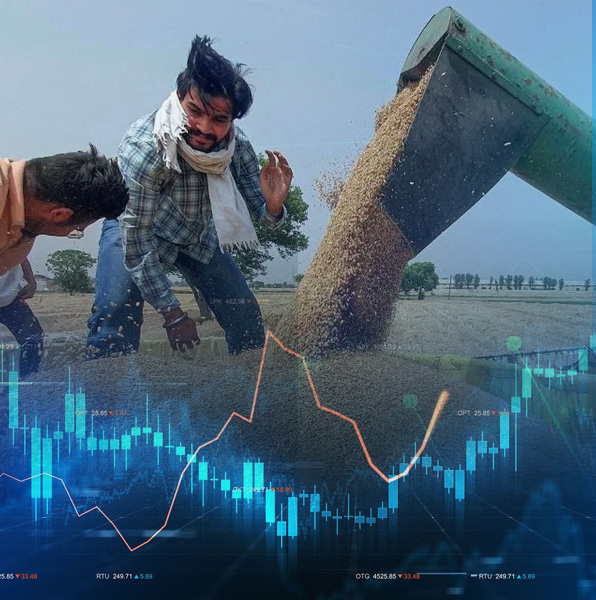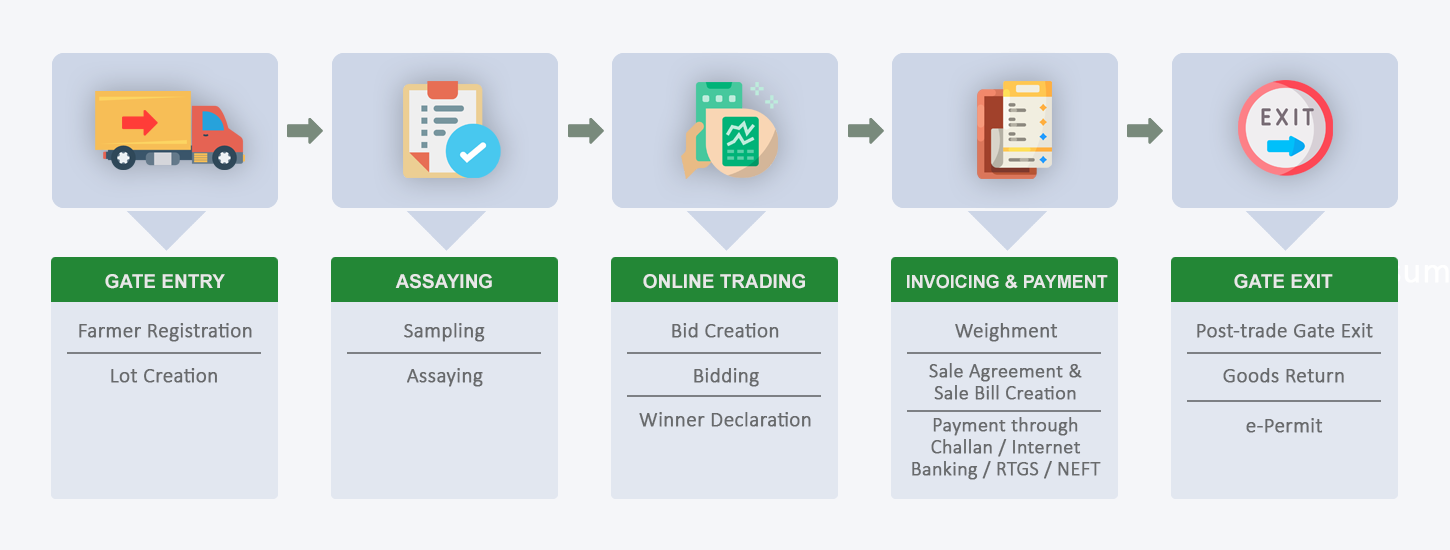Digital Trading Platform
Network of all the existing APMC to create a unified market
Digital Trading PlatformBefore we tell you about Micropro-developed digital trading platform, let us tell you about how trading takes place in any typical agriculture market.
If we consider any traditional agriculture marketplace then following is the scenario that takes place.
A seller (farmer) first brings in his commodity that he wants to sell. The commodity is usually brought in trucks, carts, or tractors. The seller then enters the mandi (market) and goes to a commission agent for sale of his commodity or chooses to sell his commodity himself. Traders, or their representatives, willing to buy agricultural commodities are also present at the market. Then, depending upon the commodity they are interested in, the traders then check the quality of the same and then decide whether to buy or not.
In such a scenario, a lot of bargaining usually takes place before the seller and trader finally settle at a price. Many a times, this means unfair prices for the farmers as there is no fixed mechanism on how the pricing is to be handled. Moreover, due to the involvement of a lot of middlemen, the sellers fall prey to even more unfair prices. Another issue the sellers face is delayed payments.

Flaws with the Traditional Agriculture Trading System
Lack of Price Transparency
The traditional trading process in physical mandis often lacks price transparency. Farmers may not have access to real-time information about prevailing market prices, leading to information asymmetry and potential exploitation by middlemen or traders.
Limited Market Access
Physical mandis are often localized, which restricts farmers’ access to a broader market. This can result in limited competition among buyers, leading to lower prices for farmers and reduced opportunities for them to explore better market options.
Middlemen Exploitation
The involvement of intermediaries, such as commission agents, can lead to exploitative practices. Some middlemen may charge excessive commissions, impose unfair deductions, or manipulate weighing scales, thereby reducing the income earned by farmers.
Inefficient Logistics
Traditional trading processes may involve multiple layers of intermediaries and manual paperwork, leading to inefficiencies in logistics and delays in the transportation of agricultural produce. This can result in post-harvest losses and decreased overall profitability for farmers.
Inadequate Infrastructure
Many physical mandis lack proper infrastructure, including storage facilities, grading and sorting facilities, and reliable connectivity. This can lead to quality deterioration of agricultural produce, resulting in lower prices and reduced market value.
Limited Access to Financial Services
Farmers often face challenges in accessing financial services, such as credit and insurance, through the traditional trading process. This restricts their ability to invest in modern farming practices, cope with risks, and improve productivity.
Fragmented Market Regulations
Regulations governing agriculture trading vary across different states and mandis, leading to a fragmented market structure. This can create confusion, inefficiencies, and inconsistencies in the trading process.
All in all, the traditional agriculture trading system has a lot of flaws and lacks transparency and reliability. To eliminate those, a new system had to be put in place that not just ensured transparency but also built a sense of trust in all its stakeholders.

Benefits
Micropro-developed Digital Trading Platform has helped facilitate the following:
- Increased market access as well as more competitive prices for the sellers.
- Digital operations and online payments to the sellers, ensuring no delayed payments.
- More transparency, security and reliability in the whole process, also ensuring more accountability.
- Better quality produce for the traders due to elimination of multiple stages in handling of produce.
Micropro Digital Trading Platform Features

User can register as a farmer, trader, FPO, or a commission agent (CA).

Over 200 commodities listed.

Real time information on traded commodities and their prices available.

It's POP (Platform of Platforms) enables users to avail numerous agriculture-related services such as warehousing, transportation etc. from various third-party service providers.

1.70 Cr Farmers, 1.6 Lakh Traders, 90 Thousand CA’s & 1800+ FPOs registered.

It is available in 12 regional languages for ease of use.

It enables farmers to list their commodities on the platform through a nearby mandi and traders can bid and quote their prices digitally from anywhere.

It is available across 1361 markets in 23 states and 4 Union territories across India and handles lakhs of transactions every day.

